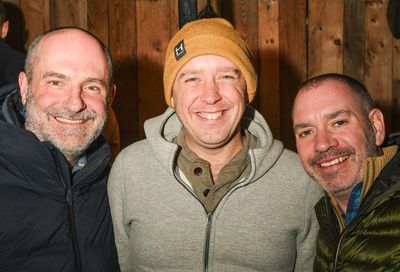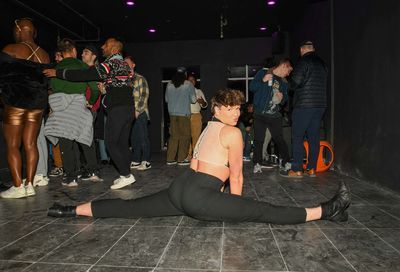Tired of COVID-19? Get vaccinated and wear a mask, gay doctors urge
As the delta variant runs rampant, LGBTQ people can help do their part to slow the spread.

I think a lot of us have let our guard down in the last two or three months because of the vaccine and because we’re a year-and-a-half into this and we’re tired of the pandemic,” says Dr. Sebastian Ruhs, the chief medical officer of Chase Brexton Health Care in Baltimore.
Ruhs knows he’s selling an unpopular message when he stresses vigilance about COVID-19 and continued dedication to masking and social distancing, even for people who are vaccinated, “but it’s important for everyone to be informed of what’s happening with COVID,” he continues. “And we’re potentially facing another challenge with the delta and possibly the lambda variant.”
Earlier this year, as vaccination rates slowly ticked up and restrictions were lifted, many people had hoped that they would soon be able to resume their pre-pandemic habits.
“Everyone got really happy and excited about having an almost normal life back where you can get back together, indoors and outdoors,” Ruhs says. “You can celebrate again, you can drink, you can sing with friends and hug them. And unfortunately, then delta variant came in and taught us a lesson of a different chapter.”
The problem with delta, now the dominant strain in many parts of the U.S., is that it spreads more rapidly, is highly contagious, and can even be spread by vaccinated individuals. Nowhere was this more evident than in Provincetown, a fishing village on Cape Cod that flourishes as a gay resort town during the summer months.
As the Fourth of July weekend wrapped up, reports of a cluster of COVID-19 “breakthrough” infections — largely affecting gay men who had already been vaccinated — began to trickle out. What happened in Provincetown was a miniature echo of what was happening around the United States at the same time, with the delta variant moving rapidly through communities and underscoring the fact that the ongoing coronavirus pandemic was nowhere near its end.
“People were getting together, assuming they had the safety and protection of the vaccine. And the delta variant was on the uprise, and close contact led to vaccinated people spreading the virus to other vaccinated people,” says Ruhs. “The good news is that the vaccines still seem to be 95 percent effective in preventing severe disease. So almost everyone in this country admitted to the hospital with severe COVID disease was almost exclusively an unvaccinated individual.”
Dr. Timothy Price, of Price Medical in Washington, D.C., has a similar takeaway regarding the effectiveness of vaccines.
“I think what these breakthrough infections tell us is that the vaccines are working quite well, because the vaccines are preventing people from getting very sick and being hospitalized,” he says. “The vaccines are working to prevent the really bad consequences of infection.”

Price says that the delta variant, while more highly transmissible, is not any more severe of an infection than the alpha variant — provided, of course, that someone is vaccinated.
“The vast majority of people will have either what I would characterize as either sort of a bad cold to mild flu-like symptoms, sore throat, stuffy nose congestion, low-grade fever, cough and fatigue,” he says. “Those are the kinds of symptoms I’ve been seeing in my patients who have breakthrough infections. Some people will have more of those symptoms than others. But I would say that upper respiratory symptoms and fatigue are the main things patients have complained of.”
Stephen Abbott, an infectious disease specialist at Whitman-Walker Health in Washington, D.C., says that despite all the press that breakthrough infections, like the ones in Provincetown, have received, it is the unvaccinated who are the most at risk of severe health consequences from COVID-19.
“We’re going to reach a point where we’re just collectively going to have to accept that coronavirus is a part of our lives right now. And the vaccine for coronavirus will become routine primary care, similar to the flu shot, a colonoscopy, a mammogram, a pap smear. It’s not going to go away,” he says.
“At some point, we’re all going to have to understand that this virus may one day infect us. But when I get exposed, if I end up getting sick, I know that because I’ve been vaccinated, my risk of severe disease and death and hospitalization is going to be much lower than if I were unvaccinated,” Abbott says.
“The more people that get vaccinated, the better off we will all be,” he adds. “Because as long as there are people out there who are unvaccinated and the virus is infecting people who are unvaccinated, every time the virus infects someone and makes millions of copies of itself — that’s what viruses do — they make mistakes, and those mistakes are causing mutations, which lead to an advantage for the virus. When a virus mutates, if it becomes more easily transmittable, as with the delta virus, we can find ourselves in a situation like where we are now. If fewer people are exposed, fewer people are infected, then there’s fewer opportunities for the virus to make copies of itself and have that chance of mutating.”
Abbott also notes that many people, particularly those who aren’t in the medical field, believe that a vaccine is a “cure-all” for the disease, as opposed to an additional barrier that may prevent one from becoming infected.

“There seems to be this misconception because there are breakthrough infections, that the vaccines are failing. That’s the wrong way, in my opinion, to look at a vaccine,” he says. “Vaccines are preventative medicine. They’re not cures. They’re not treatments. They’re meant to decrease the severity of symptoms and ailments.
“If you get exposed to the flu, if you get exposed to Hepatitis A, Hep B, or in this case, if you get exposed to the coronavirus, you may still test positive and have symptoms. But those symptoms will be much less severe than people who are unvaccinated,” says Abbott. “If you are vaccinated and you go to a circuit party or the beach or a wedding and get exposed to coronavirus, you may end up with a fever, chills, body aches, or you may not have symptoms at all. But somebody who accompanied you who is unvaccinated and gets infected is at risk of having difficulty breathing to the point that they have to be admitted to the hospital for supplemental oxygen, and then they’re at risk of ending up on a ventilator and dying.”
Asked whether LGBTQ individuals, particularly gay men, could be at increased risk due to behaviors such as attending circuit parties, clustering in vacation towns like Provincetown or Rehoboth, trips to Puerto Vallarta, or embarking on cruises where it’s nearly impossible to socially distance, Abbott says that any large gatherings where people are clustered together is potentially a super-spreader event.
“What happened in Provincetown was a lot of events that were originally scheduled to be outdoors and up moving indoors because of thunderstorms and bad weather. So any time you have large gatherings indoors, whether it’s a dance party in Provincetown or a basketball game in Chicago, you’re going to have increased risk of infection,” Abbott says.
“But I really think it’s more about the context of where you’re socializing. And if, as gay men, we’re socializing in large groups under strobe lights, then we’re going to have some situations where the risk of transmission is higher. But if you’re vaccinated and you’re in that environment and you do get exposed, what we see from Provincetown is that those folks didn’t get seriously sick.
“The way I see Provincetown is a preview of our future,” he adds. “If you’re vaccinated, you may get sick, but you’ll get less sick. But you can participate in activities that you were doing before the pandemic, because the vaccines work.”

Price says that any time a large amount of people are placed in a small, enclosed space, there’s a tendency to spread respiratory infections among members of the group.
“Even in non-COVID times, whether it’s MAL or a circuit party or other events where you put a lot of people into a closed space for a long period of time, some people are going to walk away from that not feeling well, and, generally, the cause is respiratory infections,” he says. “With respiratory droplets, the stuff that we breathe out of our mouth and out of our nose, if there are other people close to us, we can spread those viruses to people around us.”
That’s why Price is emphasizing the importance of vaccinations and masking — the only two tools people have at their disposal to protect themselves from COVID-19.
“If we could get the American populace to do that, to get vaccinated, wear masks when you’re indoors and in crowded situations, we would be seeing very low transmission of the virus,” Price says. “And that’s the message that needs to be repeated over and over.”
Abbott, of Whitman-Walker Health, says that he’s personally begun asking people that he plans to socialize with if they’re vaccinated before gathering in large groups, in the hope that it may spark conversations about the importance of getting vaccinated. That said, because he is vaccinated, he also feels comfortable venturing out in larger groups, knowing that he has some level of protection from the virus.
“I don’t think we’ll ever be able to walk into a room and be absolutely certain that everybody in that space is vaccinated. And I don’t want to recommend policing everyone’s vaccine status,” he says. “But if you’re personally concerned about possible infection, severity, illness, and death, all you can really control is your own behavior and getting vaccinated. Once you’re vaccinated, follow the local mask mandates.”

Abbott also acknowledges that, once government or business restrictions are lifted, there will undoubtedly be a bump in transmissions of COVID-19. But at some point, the restrictions have to be eased. What’s important is that public health officials make educated, well-informed decisions about how and when to lift restrictions, and remain flexible enough to tailor their recommendations based on the latest scientific evidence.
“The situation is going to continue to evolve,” he says. “That is the nature of an epidemic or a pandemic. You scale back restrictions, you see what happens and then you may have to readjust.
“I read an article using an analogy of flying on a plane when turbulence hits. You take off, you hit 10,000 feet and you’re allowed to take off your seatbelt. But then you hit turbulence and the captain tells you to return to your seat and put on your seatbelt,” he adds.
Ruhs, of Chase Brexton Health Care, notes that while the virus doesn’t differentiate between people based on sexual orientation, gender identity, or any other characteristic, certain behaviors might put some, although not all, LGBTQ people at higher risk.
“Every individual is different. But we know that members of the LGBTQ community are more likely to smoke. Alcohol consumption can be higher, and the consumption of party drugs is certainly more prevalent than in other segments of the population. So, when people are under the influence of alcohol and drugs, there certainly is a risk of getting closer together, celebrating together and making it easier for the virus to spread. However, I just want to point out that is a very small and specific segment and should certainly not be generalized to the larger population.”

Ruhs also notes that while the risk of getting infected is similar for all people, the risk of the virus causing symptomatic disease is higher in someone who has underlying health conditions.
“Anything that impacts the immune system — that can be aging and can be cigarette smoking, obesity, high blood pressure, diabetes and HIV, cancer — has an impact on the immune system,” he says. “And the more they impact the immune system, the higher the risk of having a severe form of a disease. For example, the data available shows that people living with HIV have a slightly higher chance of ending up in the hospital when they get infected. So what that means is that we shouldn’t panic, but we should all get vaccinated because again, the vaccine with the Delta variant is still 95-plus percent or more effective at preventing severe disease. So especially for people with underlying health conditions, it’s important to get the vaccine.”
Ultimately, Ruhs acknowledges that people are “tired of the pandemic.”
“I’m tired of it. I don’t know anyone who isn’t,” he says. “And I think socializing is important, and we should do it now in some way, as long as we can still be outside and do it in a somewhat cautious way until we have the virus under better control.
“All that means is the same rules we learned over the past year apply. So essentially, avoiding indoor gatherings, gathering outdoors, trying to avoid hugging and kissing and standing a little but further apart, and avoiding handshaking when possible,” says Ruhs. “I would recommend against meeting in bars and restaurants, especially because we know that those are the highest source of outbreaks, especially among young people. And I know that wearing a mask has become a little bit annoying, but it’s the most effective measure we all have.”
Related:
92% of LGBTQ adults have received at least one dose of COVID-19 vaccine, survey says
LGBTQ youth suicides may have increased during COVID-19 pandemic, bucking national trend
A Year of COVID: Our readers weigh in about life during a pandemic
Support Metro Weekly’s Journalism
These are challenging times for news organizations. And yet it’s crucial we stay active and provide vital resources and information to both our local readers and the world. So won’t you please take a moment and consider supporting Metro Weekly with a membership? For as little as $5 a month, you can help ensure Metro Weekly magazine and MetroWeekly.com remain free, viable resources as we provide the best, most diverse, culturally-resonant LGBTQ coverage in both the D.C. region and around the world. Memberships come with exclusive perks and discounts, your own personal digital delivery of each week’s magazine (and an archive), access to our Member's Lounge when it launches this fall, and exclusive members-only items like Metro Weekly Membership Mugs and Tote Bags! Check out all our membership levels here and please join us today!

























You must be logged in to post a comment.